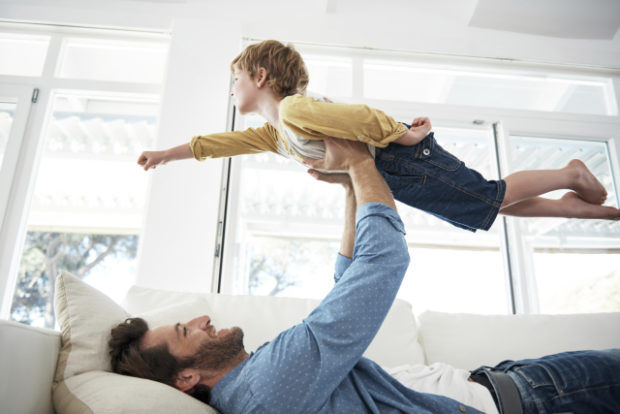Dads who play with their kids might help in improving their children’s self-control

Father-child playtime could help children regulate their emotions, according to new research. Image: shapecharge/Istock.com
New European research has found a link between fathers who play with their kids from a young age and a child’s ability to control their behavior and emotions as they get older.
Carried out by researchers at the Faculty of Education at the University of Cambridge, U.K. and the LEGO Foundation, Denmark, the new research looked at 78 studies published over the last 40 years to find out more about how fathers play with their children in the first three years of their life, how it differs from playtime with mothers, and what effect this playtime might have on children later on.
The findings, published in the journal Developmental Review, showed that on average, most fathers play with their child every day.
There were also many similarities between the ways moms and dads play with their young children, but fathers did tend to engage in more boisterous, physical play with their kids, such as tickling and chasing them and giving piggyback rides. Even when playing with babies, dads were more physical, although at this young age that meant just picking them up or helping them to gently raise their limbs.
The researchers also found that in almost all of the studies they looked at, there was a consistent link between father-child play and a child’s ability to control their feelings as they grew up. Children who enjoyed playtime with their dad were less likely to show hyperactivity or emotional and behavioral problems, more likely to be able to control feelings of aggression, and less likely to lash out at other children during fall-outs.
The researchers say that this may be because the physical, rough-and-tumble play that fathers prefer helps to develop these particular skills.
“Physical play creates fun, exciting situations in which children have to apply self-regulation,” explains researcher Paul Ramchandani. “You might have to control your strength, learn when things have gone too far — or maybe your father steps on your toe by accident and you feel cross!”
“It’s a safe environment in which children can practice how to respond. If they react the wrong way, they might get told off, but it’s not the end of the world — and next time they might remember to behave differently.”
However, the authors stress that children who grow up only with their mother are not necessarily missing out on developing these skills.
“One of the things that our research points to time and again is the need to vary the types of play children have access to, and mothers can, of course, support physical play with young children as well,” Ramchandani added.
“Different parents may have slightly different inclinations when it comes to playing with children, but part of being a parent is stepping outside your comfort zone. Children are likely to benefit most if they are given different ways to play and interact.” NVG
RELATED STORIES:
Sleeping in the same bed as your partner could improve your sleep